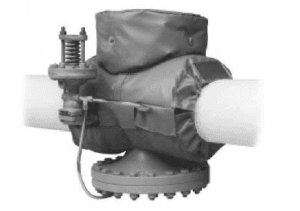The Unsung Heroes of Pipe Support: Unraveling the Benefits of Pipe Rings
Leave a CommentPipe rings, also called pipe hangers or pipe supports, are essential components that maintain the integrity and stability of pipelines. They suspend or anchor pipes to prevent sagging, vibrations, or undue stress. They are also made from metal or plastic, chosen based on the application and the weight of the pipes they must support.
The following benefits of pipe rings make them a practical and cost-effective solution for various piping applications:
1. Support and Stability
Over time, pipes can experience gravitational forces and thermal expansion and contraction, causing them to droop or sag. This can disrupt the flow of fluids or gases within the system, which can lead to damage or inefficiencies. Pipe hangers effectively counteract the forces of gravity by anchoring the lines at regular intervals. They ensure that everything remains in their intended position.
2. Stress Reduction
Pipes in any system are subject to different forces and conditions that can induce stress and strain. These include thermal expansion and contraction, pressure differentials, and external forces from structural loads or vibrations. Pipe rings serve as a strategic countermeasure against these stressors. They distribute the weight and forces along the length of the pipes, preventing localized stress concentrations.
A key consequence of reduced stress is preventing damage to the piping system. When components get overly fatigued, they become more prone to damage, including leaks, ruptures, or joint failures. Such issues can result in costly repairs, product loss, and other safety concerns. Moreover, properly supported pipes wear and tear less, contributing to a longer lifespan.
3. Alignment Maintenance
The primary function of pipe hangers in alignment maintenance is to prevent lateral movement of the components. Lateral movement can occur due to external forces, thermal expansion, contraction, or ground settlement. When pipes shift laterally, it can lead to misalignment, which in turn disrupts the flow of fluids or gases.
Maintaining appropriate alignment through the rings is also important for optimal performance in any piping system. Correct positioning ensures that the structure performs as intended in industrial processes, water distribution, and heating systems. It also improves constant flow rates, decreases energy waste, and lowers the chance of clogs or obstructions caused by misaligned components.
4. Ease of Installation
Pipe rings are created with the user in mind. They are easy to install, requiring minimal specialized equipment or expertise. This makes them accessible to all users, from professional contractors to do-it-yourself enthusiasts. The ease of installation stems from their uncomplicated design and the availability of standardized mounting methods, such as bolting or clamping.
5. Versatility
Pipe hangers are available in a wide range of designs. Some are simple, unobtrusive parts that can support pipes from below, while others are more complex, with multiple attachment points for added stability. The design variety ensures a component suitable for virtually any configuration or requirement. They can also be manufactured from metals like stainless steel or galvanized steel, plastics, or composite materials.
6. Compliance With Codes
Various industries, such as construction or plumbing, have established regulatory frameworks that dictate the specific parameters for pipe installations and supports. These regulations are put in place to safeguard public safety, environmental well-being, and infrastructure integrity. Compliance with these codes is mandatory.
Pipe rings are integral to achieving compliance with these standards. They are designed and manufactured in alignment with industry-specific guidelines, ensuring they meet the necessary structural and safety criteria. Properly installed components act as a means of fulfilling the prescribed support requirements, including spacing, load-bearing capacity, and alignment.
Discover High-Quality Piping Hardware With Caylor Industrial Sales
Caylor Industrial Sales is your ultimate one-stop destination for all your hardware and industrial supply needs! We can streamline your procurement process by providing a comprehensive selection of hangers and related products conveniently available under one roof. Furthermore, our commitment to delivering top-quality products ensures that your projects run smoothly, efficiently, and successfully.
Contact us today or request a quote now!






 Recent news reports about the U.S. construction industry all comment about the growth of the industry in 2014. Numbers are up, and contractors are saying they’re optimistic about the future. The upward, positive trend is expected to continue happening across the country, and close to home here in Georgia, in the months ahead. In fact, according to a
Recent news reports about the U.S. construction industry all comment about the growth of the industry in 2014. Numbers are up, and contractors are saying they’re optimistic about the future. The upward, positive trend is expected to continue happening across the country, and close to home here in Georgia, in the months ahead. In fact, according to a 

